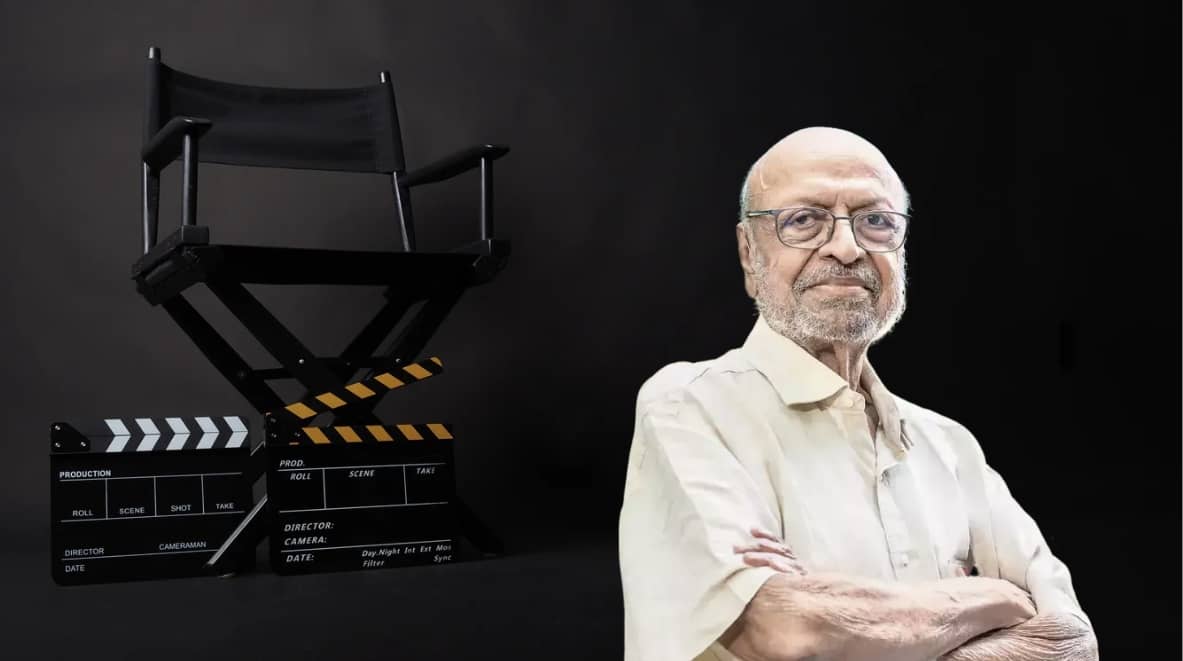Renowned Indian filmmaker Shyam Benegal has passed away at the age of 90. He was receiving treatment for chronic kidney disease. Throughout his illustrious career, Benegal directed numerous acclaimed films, including “Ankur,” “Nishant,” “Manthan,” and “Bhumika.” His contributions earned him multiple accolades, notably the Dadasaheb Phalke Award, India’s highest honor in cinema, and 18 National Film Awards.
About Shyam Benegal
Shyam Benegal was born on 14 December 1934 in Hyderabad. He belonged to a Konkani-speaking Chitrapur Saraswat Brahmin family. His father, Sridhar B. Benegal, was an accomplished photographer. At the age of twelve, Shyam made his first film using a camera gifted by his father. He completed his M.A. in Economics from Osmania University. During this time, he helped establish the Hyderabad Film Society.
Family Background
Shyam Benegal is related to the renowned film director and actor Guru Dutt. Their grandmothers were sisters, making them second cousins.
Career Beginnings
In 1959, Benegal began his career as a copywriter at Lintas Advertising in Mumbai. He quickly rose through the ranks to become the creative head. In 1962, he made his first documentary film, “Gher Betha Ganga” (Ganges at the Doorstep). He also worked briefly at another advertising agency, ASP, before focusing on filmmaking.
Documentary Filmmaking
Benegal directed over 900 sponsored documentaries and advertising films during his advertising career. He gained recognition for his documentary “A Child of the Streets” (1967). He taught at the Film and Television Institute of India (FTII) in Pune from 1966 to 1973 and served as the institute’s chairman twice.
Feature Films
Benegal’s first feature film, “Ankur” (The Seedling), was released in 1973. It depicted economic and sexual exploitation in Telangana and introduced actors like Shabana Azmi. The film won the National Film Award for Second Best Feature Film. His subsequent films, “Nishant” (1975), “Manthan” (1976), and “Bhumika” (1977), solidified his reputation as a leading filmmaker of the new wave cinema.
New Wave Cinema
Benegal’s films from the 1970s are considered very important in the New India Cinema movement. He frequently collaborated with actors from FTII and NSD, including Naseeruddin Shah and Smita Patil. His works often explored themes of social justice and rural empowerment.
Notable Films
Television Projects
In the 1980s, Benegal shifted to television, directing acclaimed series like “Bharat Ek Khoj” (1988). This series was based on Jawaharlal Nehru’s book, “Discovery of India”. His work on television helped sustain his career during the decline of the New Cinema movement.
Biographical Films
In the late 1980s and 1990s, Benegal began focusing on biographical narratives. He directed “Satyajit Ray” (1985), a documentary on the legendary filmmaker. His trilogy on Indian Muslim women includes “Mammo” (1994), “Sardari Begum” (1996), and “Zubeidaa” (2001).
Recognition and Awards
Benegal has received numerous accolades throughout his career. He won eighteen National Film Awards and a Filmfare Award. In 2005, he was awarded the Dadasaheb Phalke Award, India’s highest honour in cinema. He also received the Padma Shri in 1976 and the Padma Bhushan in 1991.
Recent Works
In 2008, Benegal released “Welcome to Sajjanpur”, which received positive reviews. He also directed the political satire “Well Done Abba” in 2010. His upcoming projects include a film about Noor Inayat Khan, a British spy during World War II, and a musical inspired by Bizet’s “Carmen”.
Production Company
Benegal owns a production company named Sahyadri Films. He is actively involved in promoting Indian cinema and serves as the president of the Federation of Film Societies of India.
Published Works
Benegal has authored three books based on his films. They include “The Churning” (1984), “Satyajit Ray” (1988), and “The Marketplace” (1989), offering vital information about his filmmaking process.
Influence on Indian Cinema
Benegal is credited with paving the way for parallel cinema in India. His films often address social issues and challenge traditional narratives. He is known for his ability to blend artistic expression with commercial viability.
Legacy
Shyam Benegal’s contributions to Indian cinema have left a lasting impact. His focus on realistic storytelling and social themes set a benchmark for future filmmakers. He remains an influential figure in the film industry, inspiring new generations of filmmakers.
Personal Life
Shyam Benegal was married to Nira Benegal. They have a daughter, Pia Benegal, who works as a costume designer in the film industry. His family has been supportive of his creative pursuits throughout his career.
Filmography Highlights
Benegal’s filmography includes works that showcase his versatility. Some notable films are: – Ankur (1973) – Nishant (1975) – Manthan (1976) – Bhumika (1977) – Mammo (1994) – Sardari Begum (1996) – Zubeidaa (2001)
Awards Overview
Benegal’s accolades include: – National Film Awards – Eighteen wins, including Best Feature Film. – Dadasaheb Phalke Award – Recognised for lifetime contribution to cinema. – Padma Shri and Padma Bhushan – Honoured for his artistic achievements.
International Recognition
Benegal’s films have been screened at various international film festivals. He has received nominations and awards at prestigious events like the Cannes Film Festival and the Berlin International Film Festival.

Leave a Reply